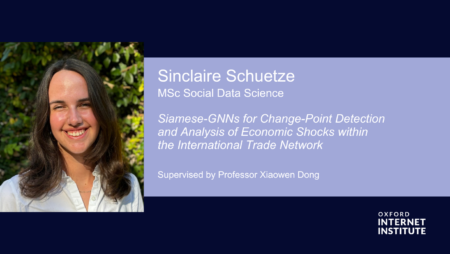
Boxi Wu
DPhil Student
Boxi (bor-shi) is a DPhil researcher at the Oxford Internet Institute and a Research Policy Consultant with the OECD’s AI Policy Observatory (OECD.AI).


Thesis title: Frictions in the Cloud: An Ethnographic Case Study of Local Data Centre Contestation of the Havering Data Centre Campus in East London
Boxi says: “I am excited and honoured to receive this award for my research conducted at the OII which explores how hyperscale data centre investments, driven by AI-hype, are shaping local social, political and environmental contexts.
This research would not have been possible without the collaboration of my interlocutors from Friends of the Earth, particularly Ian Pirie, and the residents of Havering who are navigating the reality of what happens when ‘the cloud hits the ground’.
I am grateful for the support of my supervisor Dr Ana Valdivia and others who shaped my research and broader experiences at the OII with an immense amount of expertise and generosity: Professor Vili Lehdonvirta, Dr Keegan McBride, Dr Bill Kelly and Dr Corinne Cath. Finally, I have to thank my incredible peers for making the course the experience of a lifetime and the unanimously wonderful Chrissy Bunyan and David Pepper.”
Supervisor Dr Ana Valdivia, says: “I am tremendously proud that Boxi has been awarded the SSI Thesis Prize. Boxi’s work Frictions in the Cloud analysed the political transformations that digital infrastructures originate in local communities in London. They have brilliantly applied the STS concept of frictions, drawing on the work of renowned anthropologist Anna L. Tsing and seamlessly integrating these theories and methodologies into the study of data centres.
It was a pleasure to be part of their ethnographic research and to engage with communities and relevant stakeholders advocating for not only responsible but also environmentally sustainable technologies. I am very glad that Boxi’s academic journey is continuing at the OII, exploring such a timely topic: the environmental impacts of digital technologies, including AI.
Very well deserved, Boxi! It has been a pleasure supervising you. Congratulations!”

Thesis title: Siamese-GNNs for Change-Point Detection and Analysis of Economic Shocks within the International Trade Network
Sinclaire says: “It’s such an honour to have my thesis recognized with this award. The thesis explores how graph machine learning can aid economic analysis by detecting shocks and their varied impacts on trade. My hope is this work can be used to understand the true impacts of trade agreements, financial crises, and geopolitical events, particularly on understudied regions of the world.
The thesis was an incredible learning opportunity, and I want to thank my advisor, Dr. Xiaowen Dong, and Valentina Semenova, who both provided invaluable expertise at the intersection of graph machine learning and economics. I am so grateful for my time at the OII – not only for the Social Data Science program itself but also for the amazing peers who created an environment that allowed research ideas to really thrive. Countless conversations expanded my technical knowledge but more importantly shaped how I think about the real-world implications of my work.”
Supervisor Professor Xiaowen Dong, says: “I am delighted that Sinclaire’s work has been recognised by a thesis prize for the Social Data Science programme. Sinclaire’s thesis combines state-of-the-art machine learning models and economic analysis, and develops a novel approach to forecasting economic shocks in international trade networks. This is both innovative in terms of the methodological design and significant in its practical implications.
Sinclaire’s interdisciplinary work demonstrates the breath and depth of her knowledge in a wide range of topics, as well as her creativity, independence, and resilience. Congratulations to her again on this well-deserved award.”
Winner: Congratulations to Katalin Schneider, MSc Social Data Science
Thesis title: Technological Surveillance at the Border: A Political Economy Analysis of Migration Control in the European Union
Katalin says, “I feel very honoured that my thesis has been chosen for this award. In my work, I traced how the European Union’s border control changed over the past ten years with the employment of more digital technologies, the inclusion of private companies and the increased involvement in third countries. Empirically, I used a mixed-methods approach, drawing both on my background in political science and international relations as well as machine-learning, NLP and network science techniques to work with and through the opacity and secrecy of my underlying data source, public procurement contracts.
It was exactly this combination of interdisciplinary methods with a strong social motivation, in this case, to contribute to a more sophisticated understanding of how these trends in border control affect individual refugees and migrants, why I wanted to study social data science in the first place. I am especially thankful for the insightful collaboration with my supervisor Dr Ana Valdivia who, for me, embodies this kind of interdisciplinary work and deeply inspires me with her engagement within but also beyond academics.
This thesis would not have been possible without my brilliant cohort. The MSc in Social Data Science was an incredible experience not just because of the course itself but because of the people. Beyond being incredibly talented, driven and creative, I have already seen many other theses evolve into papers and other contributions, it was the open and collaborative energy in the group that truly stood out to me. I believe it was this atmosphere that allowed everyone to grow beyond her or himself both academically and personally.”
Supervisor Dr Ana Valdivia, says: “I am extremely delighted that Katalin has received the SDS Thesis Prize. Her dissertation highlights the need for interdisciplinary academic work to better understand societal phenomena, such as the use of surveillance technologies at the border. She brilliantly executed a computational methodology that demonstrates three key aspects of the EU’s borders: agencification, privatisation, and externalisation.
In fact, the EU’s borders have been externalised to third countries over the past five years, which may have negative consequences for people on the move, escaping conflicts or climate change threats. Katalin’s thesis is an excellent and rigorous combination of political science theory and computational methods, and I hope it inspires other students to push the boundaries between disciplines and methodologies.
I am confident that her work will have a significant impact on critical data studies and the political economy of migration. Very well deserved, Katalin! It has been a pleasure supervising you. Congratulations!”
Sofia (Franziska) Hafner, MSc Social Data Science
Thesis title: All is Fair in Love? Assessing Fairness in Dating App Recommendation Algorithms via a Controlled Online Experiment
Supervisor: Dr Luc Rocher
Sneha Kotecha, MSc Social Data Science
Thesis title: A Prescription for Accuracy: Mixture of Experts Models in Medical Question Answering Systems
Supervisor: Dr Adam Mahdi
Justin (Wang Ngai) Yeung, MSc Social Data Science
Thesis title: Criminal Network Robustness: Effectiveness of Network Attack and Defense Strategies
Supervisor: Professor Renaud Lambiotte
Eily Lo, MSc Social Data Science
Thesis title: Algorithmic Bias in Mortgage Lending
Supervisor: Dr Luc Rocher
Nathan Davies, MSc Social Science of the Internet
Thesis title: Move Fast and Break Things: Why the United Kingdom’s Digital Government Struggles to Procure Technology from Startups
Supervisor: Dr Keegan McBride
Congratulations once again to all our winners!
